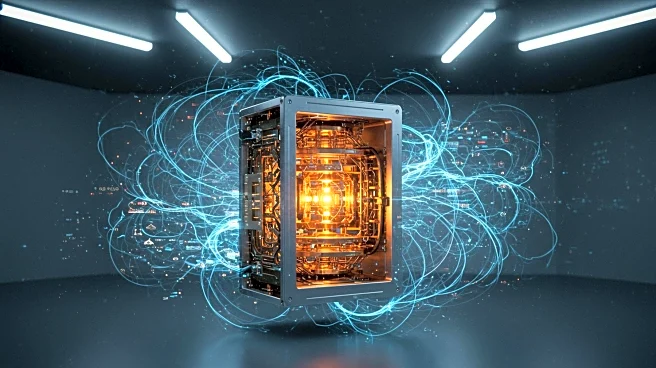What's Happening?
Artificial Intelligence (AI) is increasingly influencing the field of physics by enabling researchers to design innovative experiments and identify complex data patterns. At the University of Toronto, experts such as Aephraim Steinberg are recognizing AI's potential to offer solutions that have long eluded human researchers. AI has been instrumental in discovering symmetries in data from the Large Hadron Collider, which are essential to Einstein’s theories of relativity, and in developing new equations related to the universe’s dark matter clumping. A notable application of AI is in quantum entanglement experiments, including entanglement swapping, which are crucial for advancing quantum technology. Software like PyTheus, created by Krenn’s team, uses mathematical graphs to design these experiments, demonstrating AI’s ability to overcome traditional human cognitive biases and expand the boundaries of experimental physics.
Why It's Important?
The integration of AI into physics research represents a significant shift in how scientific inquiries are conducted, potentially accelerating discoveries and innovations. By automating complex data analysis and experiment design, AI can enhance the efficiency and accuracy of research processes, leading to breakthroughs in understanding fundamental physical phenomena. This advancement could have profound implications for various industries, including technology and engineering, by providing new insights into quantum mechanics and relativity. Researchers and institutions that leverage AI in their work may gain a competitive edge, driving progress in scientific knowledge and technological applications.
What's Next?
As AI continues to evolve, its role in physics research is expected to expand, with more sophisticated algorithms and tools being developed to tackle increasingly complex scientific challenges. Researchers may explore new areas of study, such as quantum computing and advanced materials, using AI-driven methodologies. Collaboration between AI developers and physicists could lead to the creation of more powerful experimental frameworks, potentially revolutionizing the field. The ongoing integration of AI in scientific research may also prompt discussions on ethical considerations and the need for regulatory frameworks to ensure responsible use.
Beyond the Headlines
The use of AI in physics not only enhances research capabilities but also raises questions about the future of scientific inquiry and the role of human intuition in discovery. As AI systems become more autonomous, the balance between human oversight and machine-driven processes will be crucial in maintaining scientific integrity. Additionally, the reliance on AI could shift educational priorities, emphasizing the need for interdisciplinary skills that combine physics expertise with AI proficiency.








